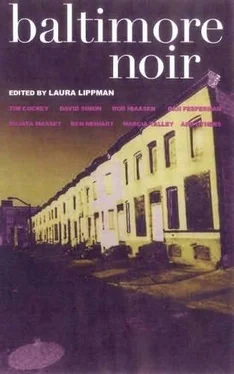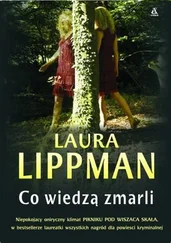Laura Lippman - Baltimore Noir
Здесь есть возможность читать онлайн «Laura Lippman - Baltimore Noir» весь текст электронной книги совершенно бесплатно (целиком полную версию без сокращений). В некоторых случаях можно слушать аудио, скачать через торрент в формате fb2 и присутствует краткое содержание. Жанр: Триллер, на английском языке. Описание произведения, (предисловие) а так же отзывы посетителей доступны на портале библиотеки ЛибКат.
- Название:Baltimore Noir
- Автор:
- Жанр:
- Год:неизвестен
- ISBN:нет данных
- Рейтинг книги:3 / 5. Голосов: 1
-
Избранное:Добавить в избранное
- Отзывы:
-
Ваша оценка:
- 60
- 1
- 2
- 3
- 4
- 5
Baltimore Noir: краткое содержание, описание и аннотация
Предлагаем к чтению аннотацию, описание, краткое содержание или предисловие (зависит от того, что написал сам автор книги «Baltimore Noir»). Если вы не нашли необходимую информацию о книге — напишите в комментариях, мы постараемся отыскать её.
Baltimore Noir — читать онлайн бесплатно полную книгу (весь текст) целиком
Ниже представлен текст книги, разбитый по страницам. Система сохранения места последней прочитанной страницы, позволяет с удобством читать онлайн бесплатно книгу «Baltimore Noir», без необходимости каждый раз заново искать на чём Вы остановились. Поставьте закладку, и сможете в любой момент перейти на страницу, на которой закончили чтение.
Интервал:
Закладка:
At the end of each summer, they traveled south: Yankee Stadium, Shea, Veterans Stadium in Philadelphia, and now they were going to see the Orioles at Memorial Stadium, Cal Ripken Jr. on his toes where Mark Belanger once roamed. Tess liked the O’s logo, the blackbird with the orange beak, the sly grin.
By the time they finished the new ballpark at Camden Yards, it’d be too late. She’d be a teenager, gone.
On went the dome light so Tess could keep sketching. He was going to mention he’d never been in the tunnel before, since it was built after he fled. But knowing Tess, she’d ask why he left and he couldn’t lie to her.
They beat the Brewers, but it’d started to rain in the fifth and the sparse crowd filed out early. He saw Tess yawn, and she was drawing in her diary, no longer keeping score. When Ripken popped to third to end the seventh, they packed up to go. A cold August night now, Tess in his denim jacket, O’s cap on the back of her head, her auburn ponytail draped over the black plastic band. Smiling, but she was dragging.
By the time he warmed up the van and headed south on Ellerslie, she was asleep, stretched across the seats, hands folded under the side of her head.
Mind wandering, listening to Chuck Thompson call the ninth, he missed Lombard, and then he was lost on the way back to a Holiday Inn standing less than two miles from his childhood home. A detour sign pulled him into the construction site for a ballpark where the B & train yard once stood: orange cones and wooden horses pressing him toward the long, narrow warehouse looking ghostly, hovering above a hole in the ground where the freight shed had been. Eutaw Street blocked off like they were going to make it disappear, and he muttered, “Where the hell…?”
Tess mumbled, brought her legs close to her chest, using his jacket now as a blanket.
He didn’t know where he was, the rain a thick mist. Lost in his old hometown, streets gone. Yellow bulldozers parked haphazardly, oily balls of light, flames flapping in the wind, and he decided he’d go east, away from the warehouse and toward the harbor. Find Lombard and get Tess to bed. The Aquarium tomorrow, a drive over to the Peabody, and then Obrycki’s for lunch on the way home.
He stopped, using the sideview to see if he could turn around without winding up in the muck.
A man shouted loud, harsh, and he snapped back, startled.
Bursting from the darkness, a girl scrambled as she raced away, terror in her eyes. Naked above the waist, her blouse torn, she tried to hold her heavy breasts in her arms as she ran, her skirt ripped too, her olive skin glistening in the van’s harsh headlights.
And the shouting man drew toward the high beams. Pockmarked and stern, short-cropped curly hair and vacant, wide-set eyes, he tugged angrily at his slacks as he splashed through a puddle and another.
The girl hurried toward the old roundhouse, her face gripped by fear.
The man stopped, his shoes catching in the mire, and he looked directly into the van, raising his hand to block the beams.
Two fists clutching the wheel, his daughter asleep behind him, and he recognized the man.
Bigelow was his name, and he could tell Bigelow didn’t know whether to chase the girl into shadows or to come over to tell whoever was in the driver’s seat to go the fuck home, sealing his mouth forever along the way.
Walking relentlessly toward the van, Bigelow tucked in his shirt and did up his zipper.
He saw Bigelow eye the Massachusetts license plate.
“Dad?” Tess said, sitting now, rubbing off the sleep.
Reverse, a K-turn, and he roared away from the construction site, then said, “Let’s get out of the rain, esoro “ Juggled in the seat, she watched as he drove onto 395, exiting to use the pay phone at an Amoco station. Rape at the Camden Yards construction site, he reported. Look for the girl at the roundhouse.
Arthur Bigelow, he added, mimicking his father’s thick accent.
Half a mind to drive to 95 and head north, but their clothes were at the hotel, and Tess’s Barbies. His Jerwyn mouthpiece in a velvet pouch.
Bigelow saw him despite the blinding lights, and Bigelow had the letters and numbers on his rear plates.
He came back around on 395 and he was near the B & warehouse again, and there was the green Holiday Inn sign, where it had been all along.
Parked underground, and as he hoisted his drowsy daughter onto his shoulder, damp jacket and her diary tucked under his arm, he tried to remember when Bigelow went from the Baltimore City Jail to the Maryland State Pen. Figured maybe Bigelow was twenty years old by then, a man, since he was entering his junior year at Mount St. Joe’s High.
Even as a kid, Bigelow was a thug, a moron, and he had a mouth on him too, and he ran down the son of the fruit-stand man, a quiet boy who wasn’t quick to fight, the boy who now clutched his daughter, the elevator rattling as it rose.
His classmates, a loud, swaggering bunch, encouraged him to smash a two-by-four across the back of Bigelow’s head. But he found it easier to withdraw, spending late afternoons and early evenings alone in the tumbledown three-room flat off Slemmers Alley.
He took a job at age thirteen as a bus boy at Sabatino’s, offered as charity to his father who held off the Arabers from his shoebox store, doing his sums on the backs of brown paper bags, totaling the cost of a half-pound of this, a quarter-pound of that, knowing not a word of English save greetings and numbers. “ Grazie, mille grazie, ” his father would say, bowing his head, his brown chin dotted with prickly gray stubble, his vest pocket torn, his pencil a nub.
While his father worked seven days from dawn to dusk, he put in forty hours a week, and with his own money he bought a trumpet and paid for lessons. His father didn’t approve, and telling him his teacher studied at the Peabody Conservatory of Music meant nothing. “ Stupido corno, ” his father muttered, his suspenders hanging loops at his sides.
“My teacher said I-”
“You can’t be like everybody else. No, not you, eh? With the goddamn trumpet. What’s wrong with you?” he spit, flinging his hand in the air. “And let me tell you, quiet boy, as for this teacher making miracles: non ci sono angeli.
No angels? “Pop, I’m saying-”
Having made his point, the old man suddenly fell into his thoughts. He headed for his bedroom and, as if talking to himself, said, “Or maybe it’s too much, too rough. This kid, he don’t fight for nobody.” Patting his pockets for a tobacco plug, he added, “Trumpet. Bah.”
In his mind, there was a red-brick wall around Little Italy, high as the warehouse at Camden Yards, high as the moon. He felt it even when he was out on Pier 5, blowing flawless scales until dawn, the cops letting him be. Blue notes disappearing in the early morning haze, and he wished he could too.
Meanwhile, Bigelow: his face a sudden riot of pimples and pustules, and now the neighborhood girls found him repulsive too. He turned to cold stone, hooked up with a gang, worked his way up to armed robbery.
The elevator stopped hard, and the man flinched, remembering Bigelow had tried to rob the Colombo Bank with a face like that and no mask. Pistol-whipping plump Mrs. Ghiardini, who had two sons at St. Leo’s and a baby girl at home, their father a fireman killed tumbling off the back of the truck one snowy night. Fifteen, twenty years ago, said the guys at Sabatino’s, nodding knowingly, they would’ve taken care of it; the cops would’ve found Bigelow floating in the harbor, hands missing, his skull a jigsaw puzzle. But out of respect for his mother, born Ana Riccardi over on Eden Street…
“We home, Daddy?” Tess whispered as he opened the door.
Читать дальшеИнтервал:
Закладка:
Похожие книги на «Baltimore Noir»
Представляем Вашему вниманию похожие книги на «Baltimore Noir» списком для выбора. Мы отобрали схожую по названию и смыслу литературу в надежде предоставить читателям больше вариантов отыскать новые, интересные, ещё непрочитанные произведения.
Обсуждение, отзывы о книге «Baltimore Noir» и просто собственные мнения читателей. Оставьте ваши комментарии, напишите, что Вы думаете о произведении, его смысле или главных героях. Укажите что конкретно понравилось, а что нет, и почему Вы так считаете.












